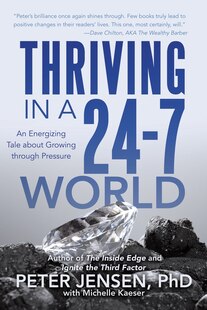
If you're a Canadian sports fan, you may already know that Peter Jensen is a Canadian sports psychologist who has worked with many Canadian sports teams and individuals, at both the amateur and pro levels. These include the Canadian Olympic team through 8 Olympic games, skater Brian Orser, the Canadian Women's National Ice Hockey Team, to name a few.
In an interview in 2010, he said that a "winning mindset" was distinguished by four attributes: imagery, perspective, time management and focus. In this newspaper interview, he discusses energy management strategies for the everyday person. Throughout, he uses imagery that really caught my interest, hence this blog post.
He recommends that people in high-energy situations act as thermostats as opposed to thermometers. Thermometers heat up, get excited and then become distracted. Thermostats, on the other hand, keep their cool. They recognize rising temps but do not participate.
He suggests that there are two states of incompetence. In the first, unconscious incompetence, we may be doing something unhealthy, but don't realize it until somewhere down the line. The second is conscious incompetence, where we know what needs to be done or to be changed, but we make excuses. "I really want to eat better but.....". Jensen tells us that a coach he knew in Alberta used to say to his players, "Stay left of your "but". In other words, stay over on that side of the sentence and start eating better, for example. So simple, so expressive, so easy to implement.
Asked about worry, Jensen says worrying is like having a leak in your head. Some worry, that leads to a positive end, for example, worrying about the safety of your kids leading you to make sure they put their seatbelts on, that's ok. But, he says, most worry is non-functional: that voice in your head is not real, so don't respond to it as if it is. The key to eliminating worry from your brain is to simplify your life (put down the electronic devices and get back to just doing what's necessary) and to recharge your batteries by getting enough rest.
Jensen knows whereof he speaks when it comes to worry. In 2010, he had throat cancer and went through 35 radiation treatments, chemotherapy etc. Who could get through that without worry! But, he says, he spent a lot of time just lying down, resting and sleeping. He's still here today to talk about it and to write this informative and inspirational book. I'm looking forward to reading it.
Here's a video from two years ago, one of a series that he made. It is directed at business leaders, but I found as I listened to it that if I replaced the word, "leaders" in my head to "parents" and the word "employees" to "kids" that the advice he gives might just be applicable to a family situation. What do you think?
I liked this one too, which is actually geared a bit more toward parents:
No comments:
Post a Comment